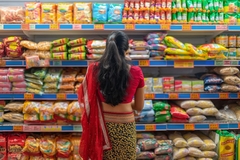
- Industry news
Industry news
- Category news
Category news
- Reports
- Key trends
- Multimedia
- Journal
- Events
- Suppliers
- Home
- Industry news
Industry news
- Category news
Category news
- Reports
- Key trends
- Multimedia
- Events
- Suppliers
US To Set Nation’s First Food Waste Reduction Goals

17 Sep 2015 --- The US Department of Agriculture (USDA) and US Environmental Protection Agency (EPA) have announced the United States' first-ever national food waste reduction goal, calling for a 50-percent reduction by 2030.
As the global population continues to grow, so does the need for food waste reduction.

"The United States enjoys the most productive and abundant food supply on earth, but too much of this food goes to waste," said Agriculture Secretary Tom Vilsack. "An average family of four leaves more than two million calories, worth nearly $1500, uneaten each year. Our new reduction goal demonstrates America's leadership on a global level in in getting wholesome food to people who need it, protecting our natural resources, cutting environmental pollution and promoting innovative approaches for reducing food loss and waste."
Food loss and waste in the US accounts for approximately 31 percent—or 133 billion pounds—of the overall food supply available to retailers and consumers and has far-reaching impacts on food security, resource conservation and climate change. Food loss and waste is single largest component of disposed US municipal solid waste, and accounts for a significant portion of US methane emissions. Landfills are the third largest source of methane in the United States. Furthermore, experts have projected that reducing food losses by just 15 percent would provide enough food for more than 25 million Americans every year, helping to sharply reduce incidences of food insecurity for millions.
"Let's feed people, not landfills. By reducing wasted food in landfills, we cut harmful methane emissions that fuel climate change, conserve our natural resources, and protect our planet for future generations" said EPA Administrator Gina McCarthy. "Today's announcement presents a major environmental, social and public health opportunity for the US, and we're proud to be part of a national effort to reduce the food that goes into landfills.”
Reacting to the statement, president and CEO of the Grocery Manufacturers Association (GMA) said: “We applaud these new nationwide goals for reducing food waste in the US. Everyone has a role to play in reducing food waste, and the food industry has already stepped forward. Last year, GMA member companies recycled 93 percent of the food waste generated from manufacturing and donated 106 million pounds of food to food banks. We look forward to continuing our work on this important issue through the Food Waste Reduction Alliance, which was formed in 2011 by GMA, retailers and restaurant and food service companies. This cross-industry alliance works to identify sources of food waste, increase the amount of food sent to food banks and decrease food sent to landfills.”
In August 2015, the UN General Assembly agreed on a goal entitled ‘Transforming Our World: The 2030 Agenda for Sustainable Development’. The plan includes are pledges to, by 2030:
• halve per capita global food waste at the retail and consumer levels and reduce food losses along supply chains;
• upgrade infrastructure and retrofit industries to increase resource-use efficiency and increase adoption of clean technologies and processes;
• ‘substantially reduce waste generation through prevention, reduction, recycling and reuse’;
• implement a 10-year framework of programmes on sustainable consumption, with developing countries taking the lead;
• improve water quality by minimising the release of hazardous chemicals and materials and ‘substantially increasing’ recycling; and
• reduce the adverse per capita environmental impact of cities, including paying special attention to municipal and other waste management.
It will be formally adopted as the sustainable development agenda by more than 150 world leaders at the Sustainable Development Summit in New York from the 25-27 September.
Following its adoption, the targets will come into effect on 1 January 2016 and leaders will pledge that the agenda will guide decision-making on regional and global levels over the next 15 years.









